Sad passing of a record maestro
mainWe regret to report the death of John Goldsmith, founder of Unicorn Records and owner of The Record Hunter shop in Waterloo.
John made some epic recordings with Jascha Horenstein – notably Mahler 3 and 6 – and with the UK-Polish composer Andrzej Panufnik, both of whom are seen in this picture. John is the tall one standing behind.
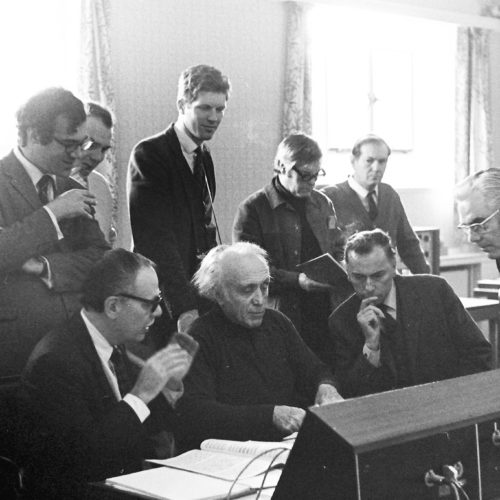

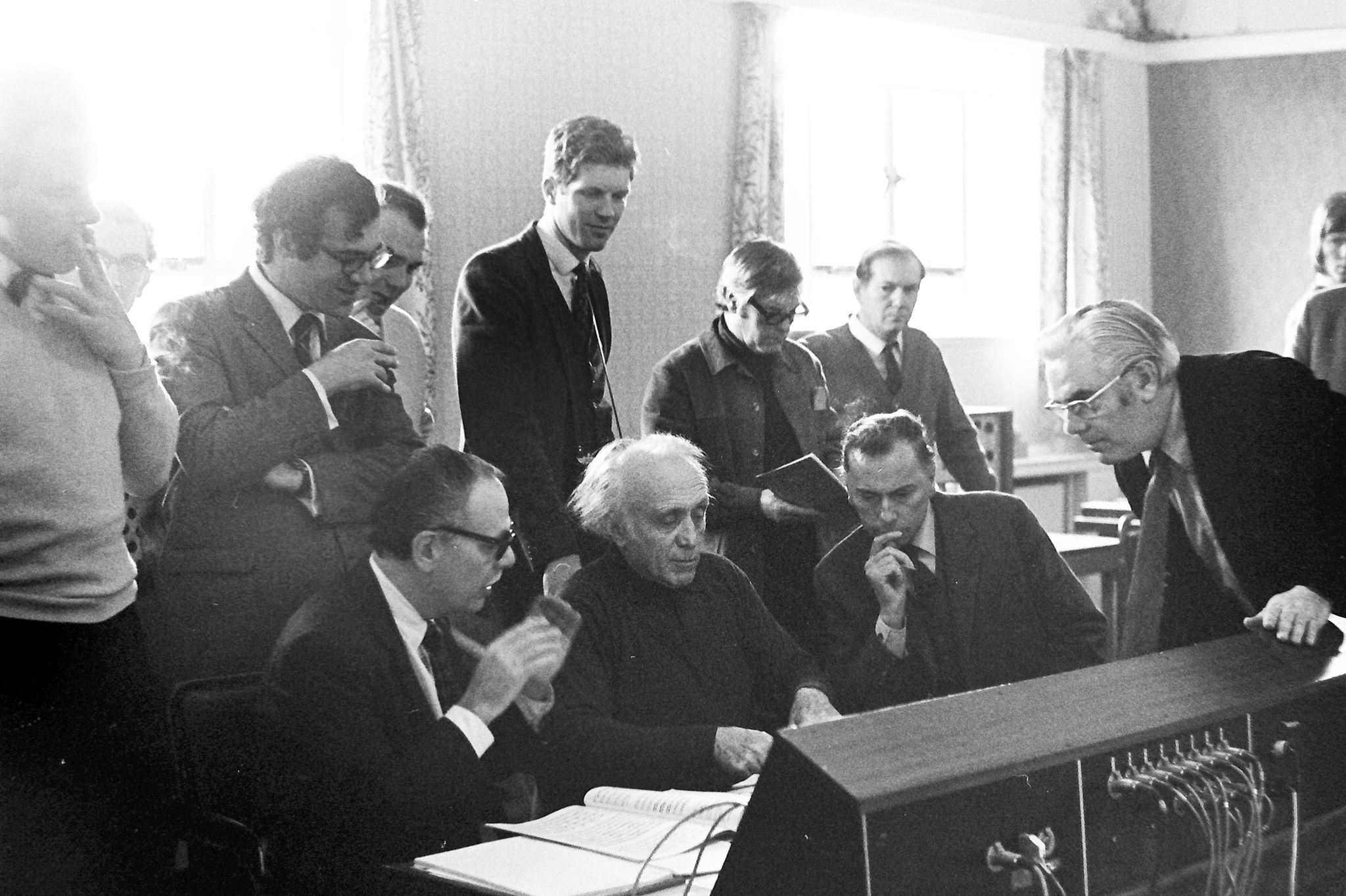
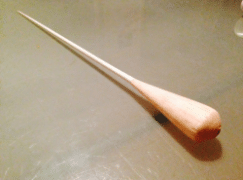

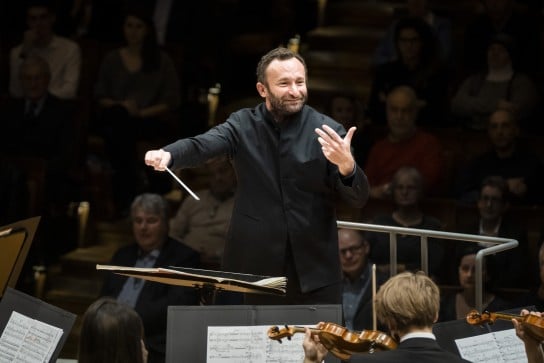
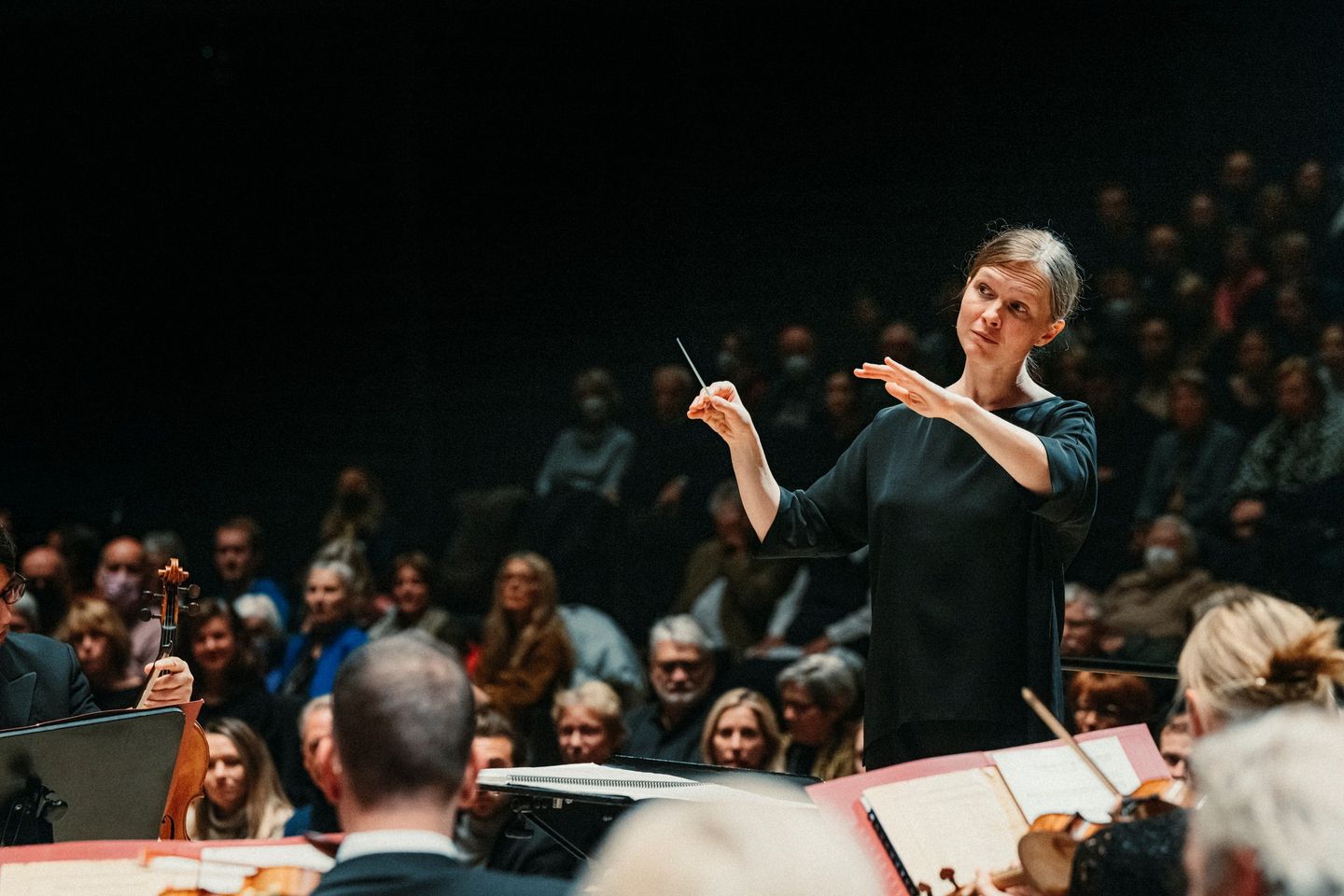
With Horenstein John was responsible for recordings of Mahler 1 & 3, Nielsen 5, Robert Simpson’s 3rd Symphony and others, all on his Unicorn label. He published Mahler 6 but was not involved in that recording. He also recorded with Stokowski, Bernard Herrman and others and was one of the first to publish Furtwângler’s recordings on LP. He was originally a London bobby but left the force to open Record Hunter.
Thank you for adding these telling details and sketching out this gentleman’s remarkable achievements. I recall all of the albums you mention. All fine.
And the Furtwängler! Merci.
Dear Mischa—who would have thought that I’d be in touch again on a blog from two years ago? But the entire subject is so compelling I couldn’t resist. As you know, I have always felt privileged to have worked “back in the day” with your esteemed relative JH, but this picture brings up far more, too. I also played many times with the very elegant an distinguished Panufnik, and knew John Goldsmith through my friend Oliver Knussen. I bought many lp’s at The Record Hunter!
I remember well the exact time John embarked on his dream to form Unicorn Records. John was a delightful human being, with a passion for following what motivated him; “Ollie” and I looked up to him greatly. How many people does one meet who follow what matters to them, no matter the odds? To try to build an independent record label in a field populated by established giant companies was not the easiest of challenges, one might say, and I will always be grateful to John for persuading JH to record on his brand new independent label. In doing so, some of the greatest Mahler recordings were made—my personal favorite being Symphony No. 1—the closest to Mahler’s written intent (e.g., observing the explicit directions all over the score), not to mention seeming to infuse Mahler’s spirit throughout in ways, which in my view, remain unequaled before or since. As you know, I also had the privilege of playing that very symphony with JH, whom I found to be a most agreeable and lovely man!
But there are so many memories in just that one picture, which come back to life in a flash. And it is so sad that we live in a time when Jascha Horenstein, Andrejz Panufnik, and John Goldsmith are no longer with us. They were all unforgettable and lifelong influences.
Take good care, Mischa!
Unicorn released some wonderful albums. My favourite was the set of six Nielsen symphonies with the LSO conducted by Ole Schmidt.
Doleful word of the passing of a salient figure in the music world.
I thought it was Jascha Horenstein center front. every inch the conductor, resembling Georg Tintner, both Furtwaengler assistants at one time I think, both great conductors without directorship of a major orchestrabut doing good work wherever they fetched up.
Horenstein’s Mahler Third for Unicorn is cited as one of the best. The Unicorn name came from a carving standing opposite John Goldsmith’s quarters.
Yes it’s Horenstein seated centre of pic, but I think Panufnik to his left
correct
Dear Mr Self, thank you for your kind comments about my late husband. He was not, however, a Furtwängler assistant, nor indeed anybody’s, but he was a student of Felix Weingartner at the Akademie für Musik in Vienna.
Tanya Tintner — Bless you for riting. It means more than I can say. I admire Georg Tintner as one of the best conductors I know, and have all his recordings I can find, especially the late concerts from Nova Scotia with his charming remarks to the audience.
His Felix Weingartner connexion is s fine as could be. I often ay, Tintner even looked like a great conductor, which some do not understand, but you will. lNot only his grand Bruckner cycle, but also Brahhs, Mozart, Beethoven — everything he did, is of the greatest interest and highest value to me.
Dear Mr Self, I thank you again; your comments really warm my heart. I wonder if you are aware of three final albums in the Tintner Memorial Edition, released quite some time after the first 10 and as downloads only? Mahler, Richard Strauss, Schoenberg and Pfitzner (all with National Youth Orchestra of Canada). If not, I suspect you may enjoy them.
thank you, Mrs. Tintner, I may have a few of those and will follow up on the rest, which I did not know of.
I’m not clever at down-loaing but my son will help me. I have some CBC or Naxos Tintner memorial editions, perhaps one at least with the youth orchestra, and will check. It’s very good news.
The composers you mention are of great interest … even Pfitzner!, whose U.S. concert premiere of “Palestrina” under Kent Nagano I attended in Berkeley many years ago. It’s extremely kind of you to write.
It is entirely my pleasure to reply to someone who is so kind about my husband’s efforts. You may perhaps be interested to know that he thought the three greatest operas written after Wagner were Palestrina, Wozzeck and Pelléas, of which he considered Palestrina the greatest.
Thank you, Mrs. Tintner. I have replied in the newest post below, in case you look for it here.
I am forever grateful to John Goldsmith and his enterprising Unicorn label for their pioneering recordings of Carl Nielsen’s major compositions – the comic opera Maskerade with Danish Radio forces under John Frandsen; the six symphonies with the LSO under Ole Schmidt; and, of course, the great Saul & David (sung in English) from 1972 and the best ever Fifth Symphony from 1966, both conducted by Jascha Horenstein.
RIP, Mr. Goldsmith.
Very sad. Nice chap.
PS. More sure he recorded Mahler 1 with Horenstein than M6. Wasn’t that latter just a recording recording acquired from Sweden?
R.I.P., Mr. Goldsmith. Some of my earliest Furtwangler listening was via Unicorn LP reissues. And the Delius/Fenby series is simply heavenly. Thank you!
The Horenstein Mahler 3 is my favorite recording of that long, inconsistent work. Horenstein comes closer than anyone else to pulling it all together.
There are some odd balances in the recording, though; strings are sometimes a bit reticent and timpani a bit over-prominent. I have the LP and a CD reissue. Wasn’t Keith Wilkinson the balance engineer? (I’m not going to dig through my collection right now to check; it’s almost dinnertime.)
No matter; it’s still my favorite recording of the 3rd.
No: it was Bob Auger, and said to be the first classical recording made using multi-track Dolby A machine (see the interesting Independent obit for more on Auger/Goldsmith)
Absolutely, of course you’re right, Mr. breunig.
Bob Auger was (is?) a well-known balance engineer for many big- and small- label projects. I remember (and have) a number of them for the VOX label.
The use of that Dolby-A machine didn’t seem to me to make a heck of a lot of difference in the final listening, Mahler Third-wise, compared to other contemporary recordings.
What’s your take on that, Mr. breunig?
Best regards, Greg
In the ’60s when the first complete
Mahler symphony sets were being recorded, critics and music lovers who had heard and recognized Jascha Horenstein’s greatness in that repertoire called out for recordings by him in up-to-date sound (his earlier Vox recordings of 1 and 9 regarded as in poor sound and roughly played). None of the record companies took up this challenge until John Goldsmith with his little outfit, Unicorn, recorded the 1st and then the 3rd with JH and the LSO –recordings widely regarded in their day as the finest of those works and still valued as among the best to this day, even with the onslaught of Mahler recordings that have ensued.
In 1970 after the 3rd was recorded, I had a phone conversation with Goldsmith and asked whether he planned to record all the symphonies with JH. He said he hoped to, but it would take time and it was quite costly due to the very large orchestra required. As it turned out, it was not to be, as Horenstein’s health declined and he died in 1973, soon before a scheduled recording of the 6th. (The live performance of the 6th from Stockholm, released after JH’s death, is not musically on the level of the 1st and 3rd.)
Alas for what might have been. Still, we owe a debt of gratitude to John Goldsmith, a gentleman, for the classic 1st and 3rd, and for the Brahms, Nielsen, Strauss, Hindemith et al., he gave us, adding to the all-too-limited
Jascha Horenstein discography. And fortunately there have since been live-perf. releases on Music & Arts, BBC Legends, Pristine, etc.
Joel, would you care to give us more info on Goldsmith and the Horenstein-Goldsmith collaboration?
Until the early 2000s Waterloo- perhaps more than any part of London- was a magnet for the discerning record collector.
I wonder how Roger Hewland is doing? I miss Gramex …
Roger is well. I have spoken recently to him
How is Roger doing? I often think of his shop
I have responded to Tanya Tintner’s post above, with a furtherappreciation of her husband Georg Tintner.
Anoither word for Jascha Horenstein’s recordings of Mahler First, Fourth, and Eighth which I have, together with the Third.
I like Horenstein’s reading of Richard Strauss’s “Metamorphosen” as well or even better than Karajan’s, Klemperer’s, the Smithsonian’s analysis, even Furtwaengler’s. He was, like Tintner, , unquestionably a great conductor, and like Tintner he looked the part, a not insignificant visual aspect of the job. I even like Horenstein’s Hindemith!
One of my favorite recordings on Unicorn that I will treasure forever is Joachim Raff Symphony No. 5 “Leonore”, London Philharmonic conducted by Bernard Herrmann. I was introduced to Raff’s music — a seriously under-appreciated composer — thanks to this recording.
Needless to say, I am saddened to hear of John’s death; he was a good friend and devoted colleague. He, of course, respected Jascha Horenstein’s decision that if patch sessions were needed for “Saul and David” I was to conduct them–perhaps anticipating his own mortality–and thus opened the door for me to work in Copenhagen in 1973 and 1974. His confidence in me–not to mention JH’s–I hope was repaid by the finished product in which perhaps fifteen minutes of Boris Christoff’s big scenes are from our sessions, seamlessly interpolated by Bob Auger; a virtuoso splicer in those pre-digital days! In this grotesque present situation with most of the world’s orchestras and opera houses on indefinite hold, it is touching to recall those exciting days, half a century back, but still somehow so close. I believe this group photo, from late December 1970, was taken by Camilla Panufnik.
A great pleasure, Mrs. Tintner! It’s interesting that your husband, rhe great conductor Georg Tintner, rated Pfitzner’s “Palestrina” as one of three great post-Wagnerian operas with “Wozzeck” and “Pelleas”.
I’m guessing he conducts the three preludes from “Palestrina'”. Thielemann did them here with Chicago Symphony; he and Furtwaengler recorded them, I have many recordings of the opera with Hotter, Wunderlich, Patzak, Fischer-Dieskau and conductors Jochum and Keilberth I think. I am eager to hear your husband’s versions with his earnest intensity, sure musical rhetoric. and rare persuasiveness.
Other admirers of ‘Palestrina” are Bruno Walter, who led the premiere in Munich in 1917 and every possible repetition; and his friend Thomas Mann, who used its opening scene in his novel about Pope Gregory called “Der Erwaehlte”, the elected one, English title “The Holy Sinner”. Mann invited Pfitzner to his home and wrote letters to andabout him. Pfiztner did not meet Frau Doktor Mann’s standard; the isits weren’t a success.
But Mann being Mann, that wasn’t enough. He thought “Only the exhaustive is truly interesting’ and penned a 19-page essay on “Palestrina” in his “Betrachtungen eines Unpolitischer”, “Reflections of a Non-Political Man”, interrupting writing Magic Mountain” to publish it. He of course broke with Pfitzner, a difficult, jealousupporter of National Socialism.
“Palestrina” is a rarity, an opera about music, the Council of Trent, and Palestrina’s writing of Missa Papae Marcelli in the new style.
I hope you agree with Thomas Mann about the exhaustive! With renewed thanks and every good wish. “
As a 17 year old working at the nearby StThomas Hospital in the mid sixties. I started calling into the Record Hunter on a Saturday lunchtime when my shift finished. John introduced me to the music of Bernstein, Copland, Gershwin, Mozart, Shostakovich and many other composers.
I also remember vividly the enjoyment he had in playing Bill Cosby and laughing at the Medic track.
I have never forgotten the hours I whiled away in the Record Hunter, and the kindness John showed me. Thanks to John I can enjoy music from many genres, and that has lasted a lifetime.
So sorry to read the sad news and thank you.
What lovely memories you fondly have of Dad. Thank you, Phillip, for sharing
Thank you Nick,
I will never forget the enjoyment of going into The Record Hunter, and wondering what music I would leave with.
Your father made an impression on me that has lasted a lifetime.
Best wishes to you and your family.